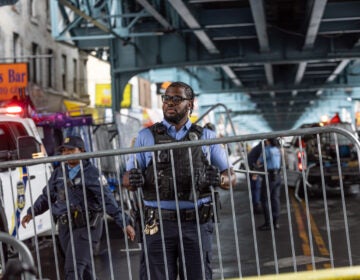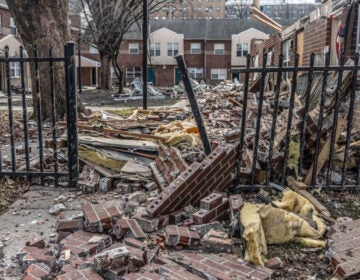Philadelphia School District top cop talks safety in midst of ongoing budget crisis
ListenIn college, and for a brief time in the NFL, it was Chief Inspector Carl Holmes’ job to protect the quarterback from being flattened into the gridiron grass.
Since joining the Philadelphia Police Department, the former offensive lineman has helped tackle street crime, spending most of his two-plus-decades on the force in patrol and narcotics.
These days, Holmes’ safety duties are a bit different. He’s now the top cop for the cash-strapped Philadelphia School District, but his commitment to keeping the peace remains the same.
“To my core, safety is what I’ve done for the last 23 years,” said Holmes, who is “on loan” from the police department.
The Roxborough resident quietly started his new gig as head of the district’s Office of School Safety in mid-October.
The appointment reportedly raised some eyebrows because the police department’s Internal Affairs Division has investigated Holmes twice.
One claim alleged that Holmes behaved inappropriately with a female subordinate. The other alleged that he shot a raccoon outside of his home. Neither case was reportedly sustained.
The aftermath of budget cuts
From a second-floor office suite inside the district’s North Broad Street headquarters, Holmes effectively serves as the day-to-day police commissioner of the city’s public school-based safety efforts.
Needless to say, it’s an important post, and one that, it could be argued, is even more so this school year.
The district’s ongoing budget crisis has heightened safety concerns after layoffs led to many schools going without the support staff they’ve relied upon in the past to help keep hallways safe. In some cases, students from rival neighborhoods are now going to school together as a result of the district closing 24 schools in June.
None of that appears to be lost on Holmes, a father of two.
“It’s the last thing I think about at night and the first thing I think about in the morning,” he said. ” Sometimes in the middle of the night, I pop up and think, ‘Did I take care of this or what do I have to do this morning?'”
Day-to-day
Holmes commands a mix of school district and police department employees, including the officers who are posted inside schools and the crossing guards who are posted on nearby corners.
Holmes must also maintain relationships with parents and act as a liaison for the school district and police department and a collection of state and federal agencies including the U.S. Department of Homeland Security.
Deciding whether or not there’s a snow day? That’s his office too.
“It’s much more than just traditional, criminal justice law enforcement,” said Holmes.
That’s not to say Holmes and his staff don’t use their police academy training. In some instances, an arrest is unavoidable. Their goal, though, seems to be to straddle the line between street cop and social worker whenever possible.
“We’re much more resource and service-oriented, seeing, ‘OK. How can we get this student the services they need versus just trying to put them in a punitive atmosphere,'” he said.
For Holmes, it’s an approach he hopes will help cut down on the number of violent incidents at his schools and, as a result, get to the district to a point where none of its schools are on the state’s persistently dangerous list.
District-wide, the number of reported violent incidents declined by 32 percent last school year, from 4,059 to 2,756, according to the district.
There are two public schools on state’s persistently dangerous list: Lincoln High School in Northeast Philadelphia and Sayre High School in West Philadelphia.
Going forward
Holmes acknowledges that his goals won’t be easy. Part of the challenge, he said, is working with a population that includes students who live in crime-ridden areas.
“We don’t import our school children from various places, they’re born and raised right here on the these streets of Philadelphia and have exhibited some of the trauma and experienced some of the despair and violence that happens on our streets,” said Holmes.
“A lot of times they manifest their trauma in acting out.”
But it’s work Holmes is more than willing to do.
“Ultimately, the children that inhabit our schools are going to become the adults that inhabit our cities and lead the way,” he said. “If we can get a handle on a lot of the disorder and some of the lack of respect issues, I think that will go a long way in creating a better society in the future.”
WHYY is your source for fact-based, in-depth journalism and information. As a nonprofit organization, we rely on financial support from readers like you. Please give today.





